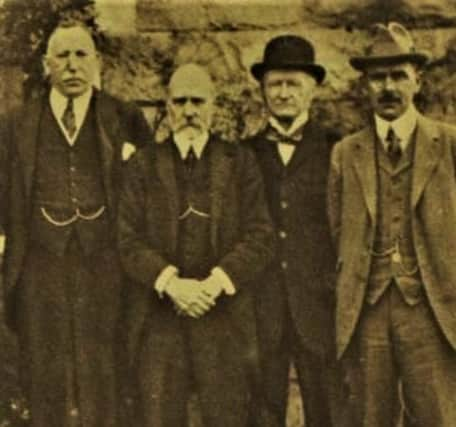Remembering Hugh Pollock, Northern Ireland’s first-ever finance minister, who served until his death


Hugh McDowell Pollock met both criteria.
Horace Plunkett, the chairman of the convention, thought Pollock ‘an extremely able exponent of the views of himself and his business associates in Belfast’ but that ‘he had no special gift for appreciating other points of view’. In doing so, Plunkett greatly underestimated Plunkett’s capacity for empathy.
Both Hugh McDowell Pollock’s parents were Ulster-Scots. James Pollock was a master mariner. His mother was Eliza McDowell.
Advertisement
Hide AdAdvertisement
Hide AdBorn and educated in Bangor, he served a shipbroking apprenticeship before embarking on career in which he would become Northern Ireland’s most highly respected and successful businessman.
He was the managing director of a flour merchants, the largest such enterprise in Ireland, and a director of the ropeworks and an insurance company. He had been a Belfast Harbour Commissioner from 1900 to 1921 and was President of Belfast Chamber of Commerce from 1917 to 1918.
His business acumen resulted in his appointment in 1917 as director of wheat supplies under the food controller for the north of Ireland.
As a member of the Irish Convention, his mastery of Anglo-Irish financial complexities earned him respect and nomination to the convention's inner committee of nine. In 1918 he was appointed chairman of the Ulster committee of the Ministry of Labour, a post he held until 1921, and during these years he also became president of the Belfast Harbour Commission. (In 1933 the Harbour Commission named the new Pollock Dock and basin after him.)
Advertisement
Hide AdAdvertisement
Hide AdWith the establishment of Northern Ireland, Pollock was an obvious candidate (apart from his age) for the new Parliament and membership of the Cabinet.
Between 1921 and 1929 he was one of the MPs for South Belfast and, after the abolition of proportional representation, the MP for Windsor.
Being a man fully attune to the commercial and business life of Ulster and its needs, Sir James Craig appointed him minister of finance and deputy premier, appointments he retained until his death.
At the time of his appointment, he was 69. He was Finance Minister lor 16 years and presented 14 Budgets, a record for British statesman. In each there was a surplus – something which would not necessarily be regarded as a virtue these days.
Advertisement
Hide AdAdvertisement
Hide AdA pre-Keynesian (‘The General Theory of Employment, Interest and Money’, the classic text, only appeared in 1936), Pollock was an orthodox liberal with a strong preference for self-reliance and book-balancing and high standards of integrity and probity.
His input to the Northern Ireland special arbitration committee (1923–5), established to review the province's funding and chaired by Lord Colwyn, ensured that Northern Ireland would be able to maintain parity of social benefits with the rest of the UK, but the grim conditions of the inter-war years and the newly agreed formula, derailed his efforts to bring Northern Ireland's underdeveloped services, in education, health, housing, and general infrastructure, up to the national level. His judicious use of the loans guarantee acts, well into the 1930s, sustained a shipbuilding industry that might otherwise have disappeared without trace. In 1932 he attended the Imperial Economic Conference at Ottawa as an advisory member of the British delegation.
He was anxious that Northern Ireland stand on its own financial feet, and disliked the cavalier attitude of James Craig who was only too happy to regard the imperial treasury was a milch cow.
For example, in 1930 he proposed additional taxation as ‘preferable to appearing as mendicants on Britain's bounty’.
Advertisement
Hide AdAdvertisement
Hide AdA devout Presbyterian, Pollock was a kindly and fair-minded man who treated his political opponents in debate with courtesy and respect.
This was much appreciated by fellow MPs as varied and diverse as Jack Beattie (the Independent Socialist MP for Pottinger), Harry Midgley (the NILP MP for Dock), Richard Byrne (the Nationalist MP for Falls) and Tommy Henderson (the Independent Unionist MP for Shankill) and was reflected in their tributes in the House of Commons on his death.
Sean McEntee, the Belfast-born finance minister of the Free State, also thought highly of him.
The warm tributes paid to him on his death by colleagues and political opponents alike were eloquent testimony to the quality and character of a man, the hallmarks of whose life were service and integrity.
Advertisement
Hide AdAdvertisement
Hide AdPollock had a keen interest in education, giving evidence to the viceregal committee of inquiry into primary education (Ireland) in 1918 and in 1922 he chaired a committee examining the provision of teacher training in Northern Ireland. For many years he served as chairman of the board of Victoria College in Belfast.
Widely travelled and read, he enjoyed golf and shooting and was a member of both the Ulster Reform Club and the Overseas League.
The remit of the latter was the promotion of international understanding and friendship through social, cultural and welfare activity. Expecting commerce and trade to be the focus of his interests, Pollock’s contemporaries were often surprised by the extent of his interest in literature and art.
He died 15 April 1937 at home in Windsor Avenue, Belfast. In 1885 he had married an American widow, Mrs Annie Robinson. They had four sons and two daughters.
Advertisement
Hide AdAdvertisement
Hide AdOne daughter, Adelaide Franklin Pollock, was an enthusiastic and celebrated aviatrix. In 1929 she flew to India and achieved celebrity as the first British woman to fly across the United States.
Her husband was Lieutenant-Colonel Arthur Spence Cleaver, a director of the celebrated Robinson & Cleaver department store.